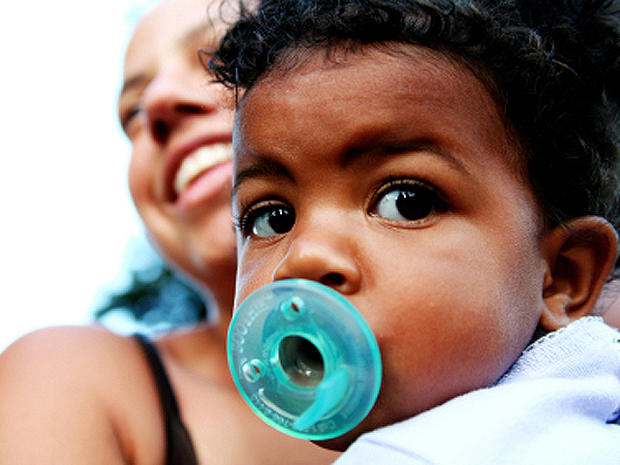Breastfeeding not limited by pacifier use after all, new study shows
(CBS News) Pacifiers interfere with breastfeeding and make it less likely a baby will latch on to mom, conventional wisdom goes. But new research suggests the opposite is true. A recent study found that limiting the use of pacifiers in newborns actually increased their consumption of formula while they were in the hospital.
Bogus beliefs: 11 medical "truths" now overturned
Sesame Street should show breastfeeding, group petitions
Do hospital freebies discourage breast-feeding?
For the study, doctors from the Oregon Health & Science University (OHSU), analyzed feeding data on over 2,200 infants whose pacifiers were restricted. Results showed that rates of exclusive breastfeeding decreased from 79 percent before the pacifiers were restricted to 68 percent once pacifiers were locked up with a special code only nurses knew . As for formula, the proportion of infants receiving supplemental formula increased from 18 percent to 28 percent after pacifiers were restricted.
These findings challenge the traditional practices of breastfeeding advocates. One of the World Health Organization and United Nations Children's Fund's "Ten Steps to Successful Breastfeeding" is to not provide pacifiers to babies.
"Taken together, the 10 steps improve exclusive breastfeeding rates in the hospital," Dr. Laura Kair, pediatric resident at OHSU Doernbecher Children's Hospital, said in a written statement. "However, the effect of pacifier use on initiation and duration of exclusive breastfeeding has not been well-established in the medical literature."
"We were really surprised and disappointed because we had hoped that limiting pacifiers would improve breast-feeding rates," study co-author Dr. Carrie Phillipi, an associate professor of pediatrics at OHSU, told TIME.
Breastfed babies tend to have fewer illnesses such as ear infections and diarrhea, and a reduced risk of certain cancers, obesity and asthma, studies have shown. The American Academy of Pediatrics recommends exclusive breastfeeding for the first six months of life, while the World Health Organization recommends it exclusively for six months then with complementary foods through age 2.
"Parents come to us looking for advice," Phillipi, who is medical director of the hospital's mother-baby unit, said. "Our hope in publicizing this study is to stimulate a conversation about the topic, especially as many hospitals are thinking of removing pacifiers to become Baby Friendly."
Is one study enough to change age-old practices? Dr. Richard Schanler, chair of the American Academy of Pediatrics' breast-feeding section, told HealthDay, "You cannot draw conclusions to change health care practices from this type of study." Schanler noted that the study did not offer information about how newborns were comforted if not by pacifiers, or how hospital staff members were educated about the research.

